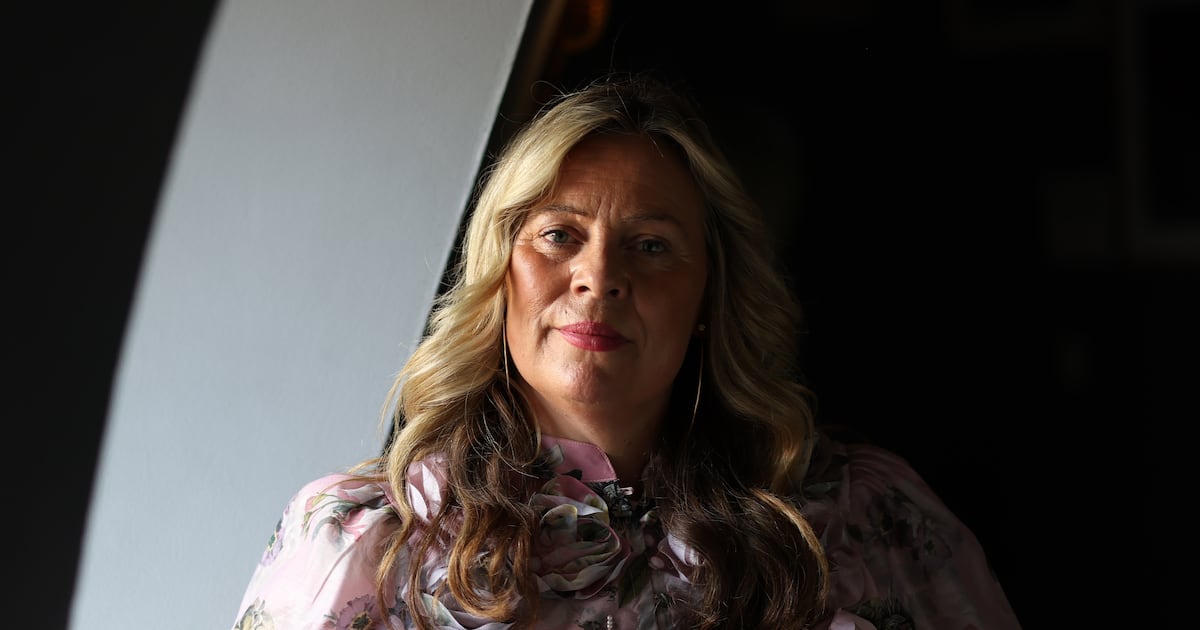In a high-ceilinged room in the bowels of the Gate, with Samuel Beckett looking on from a portrait on the wall, the writer and academic Katriona O’Sullivan and the playwright Sonya Kelly are talking about the stage adaptation of Poor.
O’Sullivan’s bestselling memoir chronicled her traumatic childhood in abject poverty and her unlikely ascent out of it, through education, sparking conversations about social inequities that are still ongoing.
“It’s my story, but it’s a lot of people’s story,” as O’Sullivan puts it, sitting on a sofa at the Dublin theatre after changing from her photo-shoot outfit into a more comfortable pink Oasis T-shirt.
The Gate was not the first to approach her with the idea of adapting her compelling book. She has been understandably hesitant in the past. “Like any person who has been through trauma, I’m hypervigilant. I need to know that people understand, that they get the story.”
The success of Poor was that it transcended the often mawkish misery-lit genre, pointing to the unfairness of a system that rewards the already privileged and further subjugates the disadvantaged. “It was me saying ‘Excellence is everywhere, opportunity is not,’ but it’s also me talking about the loss of my mam and my dad and how they weren’t served well. I wanted to make sure the Gate got that.”
Poor tells the story of O’Sullivan’s life in Coventry and Birmingham, where she spent her childhood with four siblings and heroin-addicted Irish-born parents.
Alongside the dysfunction were bright moments, including a nursery teacher called Miss Arkinson, who taught O’Sullivan, “the smelly kid”, how to wash and left clean underwear for her. There was another teacher, Mr Pickering, who encouraged her to take GCSEs (the equivalent of the Junior Certificate), and a youth worker who noticed her love of reading. Still, by the age of 15 she was pregnant and homeless, eventually moving with her baby son, John, to her father’s native Dublin.
A young mother with addiction issues, O’Sullivan spent years in chaos and dysfunction before recovery and a chance meeting on O’Connell Bridge led her to join Trinity College Dublin’s access programme. She graduated with a first-class degree in psychology and later completed a PhD. Dr Katriona O’Sullivan is now based at Maynooth University, where she oversees the Stem Passport for Inclusion programme, which addresses unequal access to courses and careers among people from underserved communities.
She is married to Dave – who features prominently in Poor – and is a mother. Hers is a remarkable and rare story, and you can see how she’d be sensitive to how it might be told.
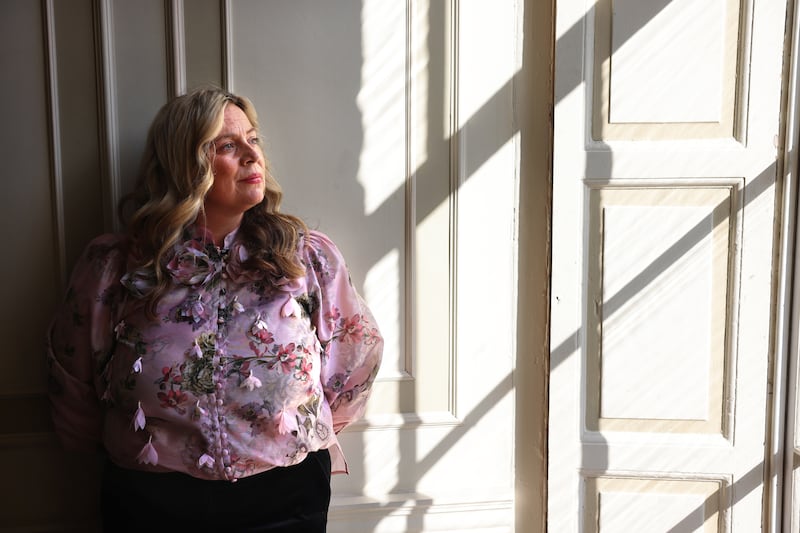 Katriona O’Sullivan: ‘I want it to be accessible, but also I want privileged people to come and see this.’ Photograph: Dara Mac Dónaill
Katriona O’Sullivan: ‘I want it to be accessible, but also I want privileged people to come and see this.’ Photograph: Dara Mac Dónaill
The initial approach came from Thomas Conway, the Gate’s new-work manager. “The first thing he said to me was, ‘We are in Dublin 1, where you got your shit together, where you lived, where you loved, where you lost. Nobody from there comes here, and we want to change that.”
It was, it turned out, the perfect pitch. “That sold me. They were really wonderful from the beginning. I said, ‘Wow, imagine if we could fill the Gate with loads of chubby Katrionas from Dublin. Imagine if we could fill the Gate with poor people and they could actually recognise themselves on stage.’” She beams, delighted by the prospect.
Sonya Kelly had not read the book when Conway approached her about adapting it. “Thomas and I went for a walk around Parnell Square which ended at the bookshop on Parnell Street. He went in, bought the book and handed it to me, and I went away with it,” Kelly says. The copy she has in her hands now is the one she received that day.
Kelly is often asked to adapt work. “There’s a responsibility to it,” she says. “I decided if I got to the end of the book and didn’t know what to do, I wouldn’t take on the job. I knew I didn’t want to waste this woman’s time. But I got to the book’s dedication page, which read ‘To me, aged seven. I’ve got you,’ and I knew what I was going to do. Sometimes you get lucky like that.”
“I’ve got you,” this exchange between the older and the younger Katriona, forms the basis of the dramatisation. “It’s a pact with herself. It’s a promise. It’s the younger version of herself and the older version making sure they get to the final page. So I thought, there lies the jeopardy in the stage production.
“Coming into the adaptation, I had a set of rules, and rules make things elegant, creatively. In the first half of the play, older Katriona has got younger Katrina. In the second half of the play, younger Katriona has got the older woman. So that’s the way I shaped all of the events in the play through this promise, this covenant.”
O’Sullivan’s feeling that her book was in safe hands only grew as Kelly worked on the script.
“Can I tell her the Annaghmakerrig story?” O’Sullivan asks.
“Tell her all the stories,” Kelly replies, smiling.
The Annaghmakerrig story is about how Kelly went off to the Tyrone Guthrie Centre, the artists’ retreat by Annaghmakerrig Lough, in Co Monaghan, to work on the second draft of the script. She’d just arrived and put her computer on the table when she got a call from Conway, at the Gate.
Kelly immediately thought it was to tell her that O’Sullivan had changed her mind about the adaptation, but just then there was a knock at the door. It was O’Sullivan – who, it turned out, was in the room above Kelly, working on her second book, Hungry. “We fell about the place laughing,” O’Sullivan says of the coincidence.
Kelly describes how, as she worked away in her room, she was “absorbing the energy of this woman by osmosis, going through some of the most harrowing experiences no human being should ever have to go through, and upstairs all I could hear was loud music and this woman singing.”
“I’m loud,” O’Sullivan says, laughing.
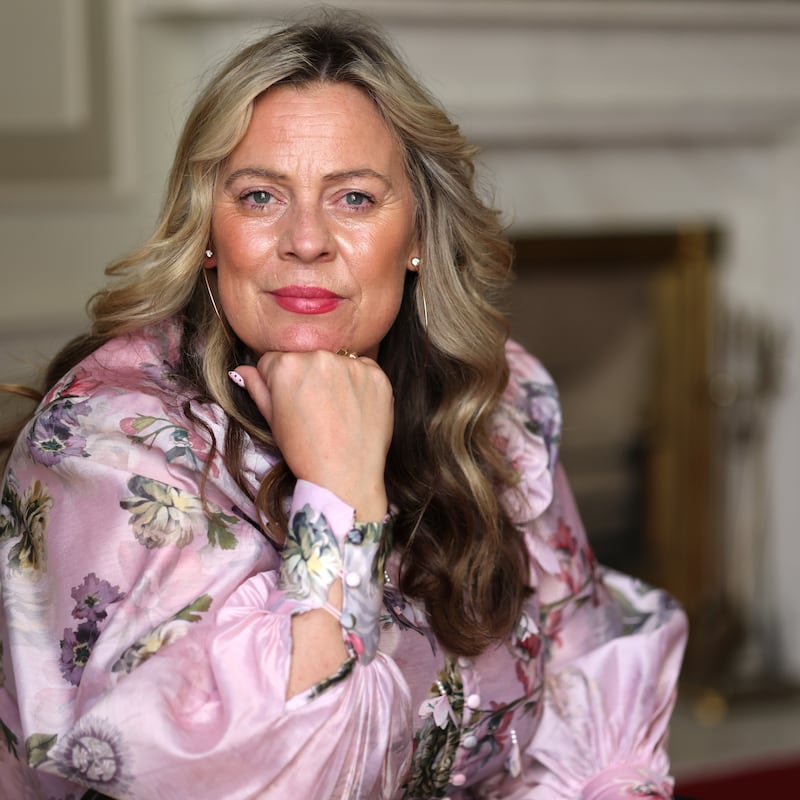 Katriona O’Sullivan, whose memoir Poor is being staged at the Gate Theatre in Dublin. Photograph: Dara Mac Dónaill
Katriona O’Sullivan, whose memoir Poor is being staged at the Gate Theatre in Dublin. Photograph: Dara Mac Dónaill
The serendipity was to prove productive. Each evening Kelly would tell O’Sullivan where she was in her story, and sometimes she’d ask questions.
“It was really respectful, the tone of the questions. That’s what mattered to me,” O’Sullivan says. “She came with an open heart – ‘I’m sorry, can I ask you this?’ – and that sense of ‘I don’t want to hurt you’ which is how everything has been underpinned in this process.”
Kelly understood the story at a level nobody else had, according to O’Sullivan. “She didn’t only see the trauma: she heard the music in the story.”
There’s a Fleetwood Mac album that punctuates O’Sullivan’s childhood; at one point Kelly told her about how that album – “this beautiful music – was made in the most crazy of circumstances, against a backdrop of addiction and madness in the band”, O’Sullivan says. “And she said, ‘This reminds me of your life, this beautiful person with all this madness going on, and you are the result of that.’ And I was, like, oh my God, she f**king sees it.”
Earlier drafts contained a lot taken verbatim from the book, but after the first read-through of the play O’Sullivan told Kelly, “I trust you. Just do your thing: bring it to life.”
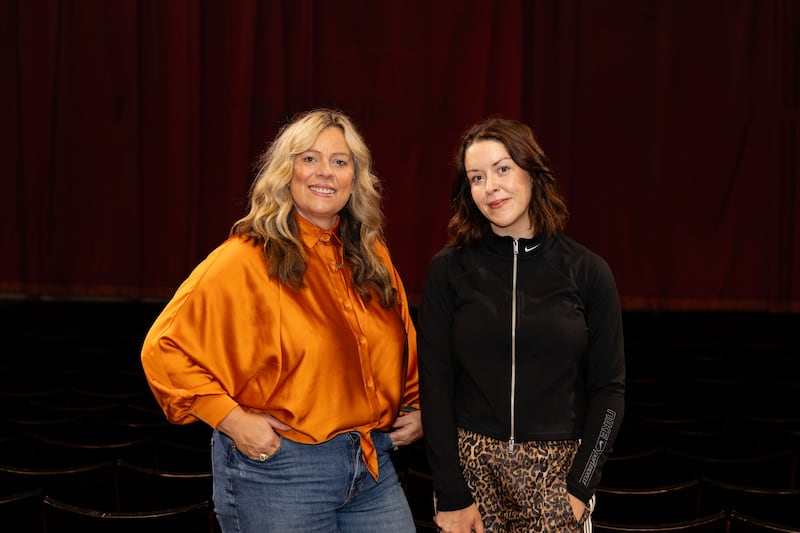 Katriona O’Sullivan and Aisling O’Mara, who plays the adult Katriona in the stage adaptation of Poor. Photograph: Ailbhe O’Donnell
Katriona O’Sullivan and Aisling O’Mara, who plays the adult Katriona in the stage adaptation of Poor. Photograph: Ailbhe O’Donnell
O’Sullivan’s input was crucial, according to Kelly. She would pick things up in the script that others would miss. “I’ve actually been able to be really creative in this, haven’t I?” O’Sullivan says to O’Kelly now. “Creative executive producer. It’s the most natural calling for you,” Kelly replies.
Kelly says that when you rehearse a new play “you have to be across things at a granular level, because it’s never been done before. It’s not like an Ibsen, where you can hop coins off it. You have to be awake to how it’s not serving the original material and act quite quickly.
“It’s rehearsed in the rehearsal room, but it’s made on the stage, so we’re going into tech and into preview and, whoa, the pieces have to move around again. That constant openness to seeing what it isn’t and what it should be has to stay alive.”
“I’m hoping Sonya will one day be happy with it,” O’Sullivan says, laughing. “The other day I came in and it was the end piece, which is so beautiful. I cried. I’ve cried so many times though this process, because it’s my life. It’s really difficult to watch. But the ending was so beautiful, and everyone clapped, and then Sonya said, ‘Can we just add this?’ I don’t know if it will ever feel finished.”
“Look, this book means an awful lot to an awful lot of people,” Kelly says. “So there’s a duty of care to not wreck it for the people who value how it has changed their lives.”
This brings up something for O’Sullivan, who describes herself as a direct person. She says she wasn’t sure at the beginning whether the theatre knew how many people loved the book. “So I said to the Gate at one point, ‘This is a brilliant book that sold over 200,000 copies. You’re going to make a lot of money from this. So let’s not talk about it like it’s a charitable endeavour.’
“Because sometimes the language around it might have been a bit ‘We’re doing a good thing for the poor people.’ And I’m, like, ‘No you’re f**king not. You’re going to make a lot of money out of this.”
The Gate was “inundated” when the play was announced, O’Sullivan says. “It smashed box-office records, and I got an email from someone in the Gate saying, ‘You were absolutely right: this was the best business decision we’ve made.’”
O’Sullivan often talks on Instagram, sometimes while styling her hair or working out at the gym, about injustices. “I’m lucky. I can express my views,” she says. “I would be looked at – as some women like me are – as being a difficult woman. I’m not difficult, but I don’t want to be hurt and I don’t want to be taken advantage of, and I am very protective of myself and of little me.”
How has the adaptation handled some of the book’s more harrowing scenes? I’m thinking particularly of the sexual assault O’Sullivan suffered as a seven-year-old and the reaction to it from her mother, Tilly, who was a sex worker.
“Yeah, well, he raped me, too,” Tilly said when her daughter disclosed the assault by one of the men who hung around their home. O’Sullivan was about the same age when she came across her father, Tony, lying unconscious, a needle in his flesh, after an overdose.
O’Sullivan says they were conscious, given that one in four people in Ireland has been sexually abused, that the rape scene could be triggering for the audience. “So I was concerned about it, but it’s been done perfectly and respectfully. It’s the same with my dad. That’s a really important scene in my life, and the play doesn’t shy away from it.
“We did have a conversation about the prostitution scene. There’s still a very complicated feeling of protection towards my mam, and sex work is something people often don’t understand. But I think what is really lovely about the traumatic scenes is how Sonya has been able to connect them through my adult life: the voices that occur during those really traumatic times are an echo throughout the play.
“You see me as a young woman making mistakes with men, but you also hear the shadow of the child, and it’s done so artistically I think it’s going to be really powerful for the audience.”
Tilly is one of the most important characters in the story “and in my life, obviously”, O’Sullivan says. “The point of Poor is for the audience to understand why women end up in the situations they do. And that scene with my dad is about how my dad was treated by people in services rather than what my dad did.”
But she doesn’t want audiences to get the wrong idea. “It’s not a gruesome play – there is loads of light and love.”
We head into the rehearsal room to watch the actors at work. Hilda Fay plays O’Sullivan’s mother, Aidan Kelly portrays her father, and Aisling O’Mara is the adult Katriona. A lively ensemble, including Thommas Kane Byrne and Ghaliah Conroy, play all the other characters.
The two Katrionas, younger and older, are together at the beginning of the play, addressing the audience directly, entreating them to come along on the traumatic but ultimately hopeful adventure of O’Sullivan’s life. “Are you ready?” they ask each other and the audience before their journey begins.
O’Sullivan is proud of the fact that there is “a diverse cast who will be playing to diverse audiences”. She says that 600 tickets have been given “to poor people, and hundreds more are being discounted. There are two showings for disadvantaged women and another for groups in addiction services.
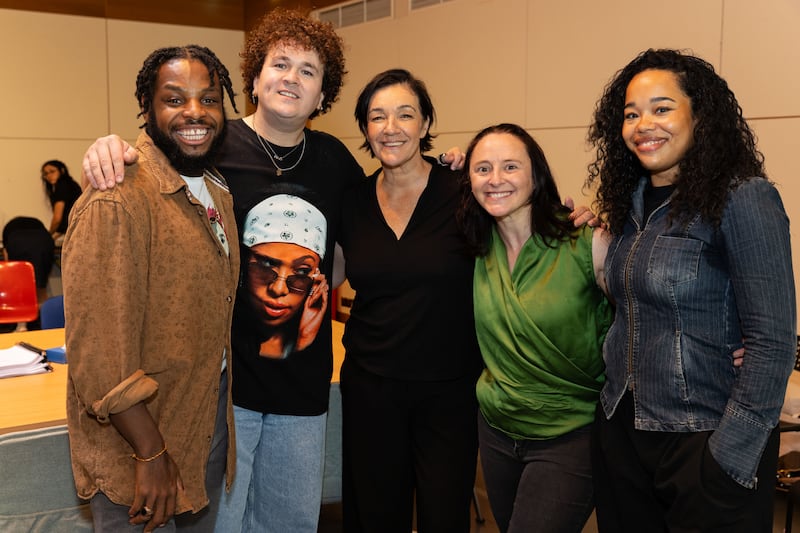 Poor: Keiren Hamilton-Amos Thommas Kane Byrne, Hilda Fay, Mary Murray and Ghaliah Conroy at rehearsals. Photograph: Ailbhe O’Donnell
Poor: Keiren Hamilton-Amos Thommas Kane Byrne, Hilda Fay, Mary Murray and Ghaliah Conroy at rehearsals. Photograph: Ailbhe O’Donnell
“I want it to be accessible, but also I want privileged people to come and see this, people who can afford €60 for a ticket, so they can learn something.”
It is, she points out, “a strange thing to see your life brought to life on stage when you are actually alive and still quite young”. Recently, the cast were interviewing her, asking about her childhood, to gain context for their interpretation of the characters.
“It’s heavy … It hasn’t been an easy decision,” O’Sullivan says of agreeing to the stage adaptation. “I’ve done it because I want to change things. I want to change how people feel about themselves. I want to change policy. I want a girl to sit in that theatre and think, ‘Maybe I wasn’t to blame.’ I want some privileged person to sit there and go, ‘Oh God, I need to do more here.’ And the cost to me is worth it in terms of the longer gain.”
The play is directed by Róisín McBrinn, the Gate’s artistic head. After a certain amount of scepticism – “she is quite posh,” O’Sullivan explains – the author has been amazed by McBrinn’s sensitivity and insight while shepherding the story on to the stage.
“To witness the journey she’s been on, I never felt …” O’Sullivan pauses, tears in her eyes not for the first time in the conversation. “I never felt so much care from somebody who I thought would never get it.”
Did this revelation chip away at the working-class chip on her shoulder? “Well, the chip was put there. I was stood on by them people, so it deserves to be there, but I’ve also learned that within all walks of life there is hurt and harm and there’s care and hope.
“Like, the response to Poor has been lots of poor people saying, ‘Oh my God, I feel seen.’ But also there’s been lots of privileged people saying, ‘How can I help?’”
Hungry, O’Sullivan’s next book – “I’m not allowed to talk about it,” she says but does anyway – is out in 2026. “I’m excited for people to read it. It’s a book for every woman. It’s a biography of my body – the things we do to our bodies to shrink ourselves – but it’s also about being hungry for achievement and hungry for connection. It’s about how we never feel we fit – in the clothes or in the f**king room.”
O’Sullivan, who has three children, says writing Hungry has been gruelling but healing. “I’ve never loved my body as much, which is great, and maybe it’s the whole point of all of this, to like myself a little bit more.”
She is director of Maynooth University’s new National Centre for Inclusive Higher Education. She was made a professor in December 2024. “It’s hard to manage it all. These are opportunities I never knew would come into my life. It’s hard to know whether to stay in academia or leave and do other things. The dream, I suppose, would be sitting in Annaghmakerrig, writing.”
An expensive designer bag sits on a chair in the room at the Gate. O’Sullivan, who is now in demand as a public speaker, bought it after receiving a hefty payment for a speech in the UK. She has plans for a third book, which she says will offer “10 rules to help yourself and help others”.
But back to the stage adaptation of Poor. Kelly says she wants audiences to come away remembering that “talent is everywhere, opportunity is not” – “I am taking your words when I say this, Katriona, but I say it so often now,” she adds. “And there are people who will come to see this show who have opportunities for people in their pockets, in their minds, in their businesses, and they need to ask themselves: where can I spread opportunity?
“Because one of the tragedies of the story for me is that Katriona O’Sullivan is an anomaly but she shouldn’t be. And that’s on us. So having it here in the Gate is a weird one, but sometimes these tiny little planets align and you go, ‘There are enough planets here to establish a galaxy.’”
“It’s going to be a brilliant, entertaining production,” O’Sullivan says. “I don’t want people to read this article and go, ‘Oh my God, it sounds so serious.’ This play has got music, it has got hope, it has got laughter and it’s got sadness and it’s got joy. It’s absolutely about my life, but it’s also about life in general – and the message is triumph. The message is triumph and hope.”
Poor opens at the Gate Theatre, as part of Dublin Theatre Festival, on Thursday, October 2nd, with previews from Friday, September 26th. It runs until Sunday, November 2nd. It is a coproduction with the Belgrade Theatre, in Coventry

